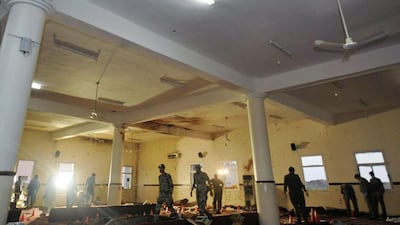RIYADH // ISIL on Thursday claimed responsibility for a suicide bombing in south-western Saudi Arabia, according to a statement circulating on Twitter.
The group said a suicide bomber had infiltrated a “military camp” for the Special Emergency Force in Asir province. The claim was made by an alleged new affiliate of ISIL, the so-called Hijaz Province.
The Saudi interior ministry said the attack killed 15 people at a mosque.
A Saudi Arabian interior ministry spokesman said the “terrorist” attack took place during noon prayers in the city of Abha.
Twelve of those killed were members of a Special Weapons and Tactics (SWAT) unit, while the other three were workers at the compound, officials said. Seven people were also wounded.
The UAE Foreign Minister Sheikh Abdullah bin Zayed condemned the incident as an “ugly terrorist crime”.
“The UAE expresses its complete and utter solidarity with brotherly Saudi Arabia in confronting terrorism in all its forms,” Sheikh Abdullah said. “The UAE stands shoulder to shoulder with the Saudi leadership in whatever draconian steps or measures they may take to eradicate terrorism and to preserve the kingdom, its stability and security, which is the cornerstone of the security and stability of the region,” he added.
Thursday’s bombing was the deadliest in a series in recent weeks against Saudi Arabian security forces, who have been targeted in attacks blamed on ISIL.
“The terrorist attack struck worshippers during prayer,” the spokesman said, giving an initial toll of 10 policemen and three workers killed and nine people wounded.
El Ikhbariya state television later said that two policemen wounded in the “heinous” attack had died, bringing the death toll to 15.
The interior ministry spokesman said the attack was likely carried out by a suicide bomber, saying that “body parts found at the scene” indicated the use of explosive vests.
The governor of Asir province, Prince Faisal bin Khaled bin Abdel Aziz, visited the site of the attack and the wounded in hospital, condemning the bombing.
“The attack is aimed at destabilising the country and sowing fear among citizens,” he said, according to the official Saudi Press agency.
On July 16 a car bomb exploded at a security checkpoint near a prison in the capital Riyadh. It killed the driver and wounded two policemen.
Officials identified the driver as a 19-year-old Saudi Arabian man and said he had killed his uncle, a colonel, before blowing himself up on a road near Al Hair prison, a high security facility.
ISIL claimed responsibility for that attack, saying it was a message to militants held at Al Hair that they had not been forgotten.
Two days later, Saudi Arabia said it had broken up an ISIL-linked network and arrested more than 430 suspects involved in attacks and plots, including suicide bombings of Shiite mosques.
The interior minister said the suspects had plotted attacks on an unidentified diplomatic mission and mosques, including one used by security forces in Riyadh.
In the southwestern Saudi Arabian city of Taif on July 3, a policeman was gunned down during a raid in which three people were arrested and flags of the ISIL group found.
An ISIL-affiliated group claimed responsibility for suicide bombings on successive Fridays in May at mosques of the minority Shiite community in Eastern Province that killed a total of 25 people.
The group calling itself Najd Province also claimed a suicide bombing that killed 26 people at a Shiite mosque in Kuwait in June. ISIL considers Shiites to be heretics.
Saudi Arabia and its Gulf neighbours last year joined a US-led military coalition bombing ISIL in Syria, raising concerns about possible retaliation in the kingdom.
The kingdom also leads a coalition that has launched air strikes since March against Shiite rebels who have overrun much of neighbouring Yemen and forced the government into exile.
Al Qaeda waged a campaign of shootings and bombings against foreigners and Saudi security personnel between 2003 and 2007.
* Agence France-Presse, WAM, Reuters

